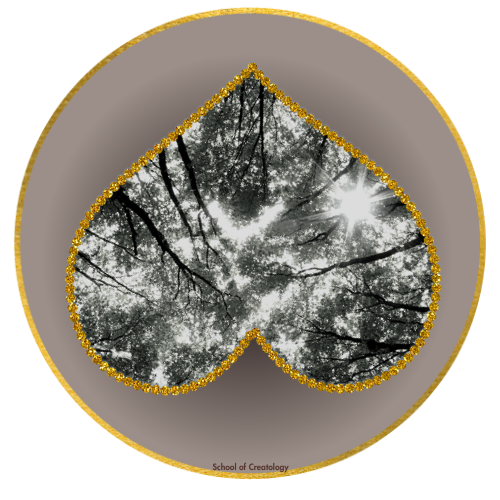
Oppressed Creativity
Our global creativity is oppressed.
Its evidence is in
our worsening personal, social, and ecological problems
despite being an era that appears highly creative.
Our creativity reduces as we grow up.
Our grassroots culture is taught it is okay… normal human development.
But, it is not.
Not only is it not okay, but our creativity is able to develop as we grow up.
Why is this important to consider?
Because our oppressed creativity has natural consequences.

A Social Justice Issue
Unless we value our creativity highly,
our creative capacities,
and our children’s creative capacities,
and their children’s creative capacities
… our children’s ability to transform conditions…
will remain under-developed,
which is really, really bad timing,
given the state of our social and ecological conditions.
Jane Macdonald
What does "oppressed" mean?
To remain in a state or condition of oppression.
“Oppression is a form of injustice that occurs when one social group is subordinated while another is privileged, and oppression is maintained by a variety of different mechanisms including social norms, stereotypes, and institutional rules”. Elenor Taylor (Taylor, Elanor (2016). Groups and Oppression. Hypatia 31 (3):520-536.)
In the case that SoC is making, oppression is
“when a specific social group is denied access to education that may hinder their lives in later life.” Iris Young. (Young, Iris (1990). Justice and the Politics of Difference. Princeton University Press. p. 1.)
Origin
‘Oppress’, comes from the “late 14c., oppressen, ‘to press unduly upon or against, overburden, weigh down,’ also figuratively, ‘overwhelm overpower’; also ‘burden with cruel, unjust, or unreasonable restraints, treat with injustice or undue severity, keep down by an unjust exercise of power”. etymonline.com/word/oppressed
Definition
‘Oppress’ means, “to keep (a person, group of people, other life forms, etc) in subjection and hardship by the unjust exercise of power”. Oxford English Dictionary, oppressed
Keywords
to press down, to put down, overburden, overpower, overwhelm, cruelty, injustice, unjust control, unreasonable restraints, undue severity, subjection, hardship, not given the same freedom and opportunities and rights as others, inequality, to keep down, to negatively effect mental health and capacity for vitality…
by force… by someone or something exercising power. Non-voluntary.
Why use the word "oppressed"?
The Cause of Creativity’s Oppression
The ways we oppress people’s creativity: (a list of synonyms)
box in, bound, disempower, impose upon, overburden, disenfranchise, hurt, dishearten, bully, stifle, afflict, exploit, dominate, show favouritism, abuse, restrict, ridicule, harm, mistreat, unjustly control, put down, misunderstand, depress, intimidate, undervalue, distress, discourage, sadden, narrow-mindedness, dispirit, demostrastions of belief in worthlessness and not having what it takes. Injustice.
The Effect of Creativity’s Oppression
The ways people live and feel when their creativity is oppressed: (a list of synonyms)
boxed in, bound, disempowered, imposed upon, overburdened, disenfranchised, hurt, disheartened, bullied, stifled, afflicted, exploited, dominated, disfavored, abused, restricted, ridiculed, harmed, mistreated, unjustly controlled, put down, misunderstood, depressed, intimidated, undervalued, distressed, discouraged, saddened, confusion over narrow-mindedness, dispirited, worthlessness, not (good) enough. Rebellious.
For example, one of the ways the Merriam-Webster dictionary defines ‘oppressed’ is: ‘to burden spiritually or mentally: weigh heavily upon,
- oppressed by a sense of failure
- oppressed by intolerable guilt.
especially through the abuse of negative social norms, stereotypes, and institutional rules.
How many Creatives experience these for simply having highly creative natures and / or while, or after, being creative?
Most Creatives hold their creative natures back when in environments that hand-down negative consequences for it. The predominant culture in the academic secondary classroom is an example.
“To survive and feel safe, we may deny parts of ourselves, but that can become painful. Some may live with the denied
aspects of themselves forever but, for others, situations arise where those denied parts want to be heard or seen.” Eugene Ellis, ‘The Impact of Oppresion’. (Psychologies magazine, Spring, 2021, p.44.)
Who can help free our creativity’s oppression?
Our global creativity movement can take a stand for creativity’s value and change our societies’ perceived value of it.
Otherwise, our educational, political, economic, even spiritual institutions can take a leading role. There is so much research available illustrating creativity’s value and need. So, I am assuming they are aware of the power of human creativity and how essential it is. If their mandate is to facilitate, even enhance life, they must liberate our social creativity.
There can only be two reasons why our institutions do not FULLY enable and develop our social creativity:
- they either contribute to, conform to, and / or perpetuate the social myths and misunderstandings about creativity for their own cause, and / or
- they too weren’t raised and educated in creativity or creatively, so it may be they know how essential it is, but ultimately, also don’t know what they don’t know.
Where oppression means “to treat a group of people unfairly or cruelly, and prevent them from having the same rights that other people in society have” (Longman Dictionary),
then all of our children, especially our children and adults who have a preference for creativity,
deserve for these institutions
to rise up and ensure we have the rights, freedom and opportunities
- to fully realise our creative potential, and
- to benefit from this creativity… including mental health and general wellbeing, for ourselves and the world around us
as they give others.
This really is a social justice issue, and an ecological justice issue as a result.
A huge 25% of Aussies have a preference for creativity*…
our most innovative, problem-solving, wellbeing-enhancing, value-adding, regenerative, collaborative, transformative, soul-fully satisfying, and
sought-after capability humankind has.
Yet, the bulk of us are raised in a society and its families and schools… cultures…
that continue to oppress our creativity by giving it a low value.
For example, how often are we enabled in school, where we spend the bulk of our daytimes as children, in ideation, experimentation, designing, making, and building?
If our:
- educational institutions understand how essential creativity is to our childrens’ future,
yet
- schools still don’t teach creativity itself
- schools only occasionally teach via the creative process
- schools rarely teach the creative process itself, and
- schools rarely uphold values of co-creative cultures, for students to develop skills in co-creating,
how can our younger generations be prepared for what is to come?
Schools have been found to substantially reduce our creativity, and we’ve known this for 20 years.
As a result, our society’s creative peak is at the age of 6. This might also mean that many of our educators have inferior creative capacities than those of the children they teach!
“We routinely witness
creativity in young children,
but it is hard to find in older children and adults
because their creative potential
has been suppressed
by a society that encourages intellectual conformity.
We begin to suppress children’s natural creativity
when we expect them
to color within the lines in their coloring books.”
So, how can it possibly be that we, as parents and teachers and brothers and aunties and bosses, and ‘leaders’
can hand down adequate creative knowledge and skills to our younger generations
who will increasingly need it more than we do?
On a societal level,
when our creativity is oppressed
we experience…
- greater destruction; devolution and decreation
- increasing personal, social, and ecological oppression, repression and depression
- worsening personal, local and global problems, eg, poverty, extinctions, climate change
- reducing ability to effect positive change
- reducing ability to identify problems, generate ideas, experiment, and problem solve
- reducing giving and reciprocity… increasing taking
- reducing ability to create (sustainable) resources
- reducing wellbeing
- increasing dependence
- reducing teamwork and collaboration skills
- increasing survival instincts
- increasing sense of entrapment
- increasing self-doubt and procrastination
- reducing living values aligned with self & co
- reducing sense of authenticity and trust
- reducing mental health
- reducing responsibility (ability to respond)
- reducing sense of community
- reducing sharing of resources, fewer resources available while using more resources
… the scales of justice, unbalanced.
Myths and fibs about Creativity which add to its oppression.
These negative social norms include:
- Creativity is enigmatic; it’s too hard to put our finger on
- Creativity has no theory, philosophy, or theology
- Creativity can’t be taught, or learned
- If we do learn about creativity, it will take all the mystery out of it
- People who question are trouble-makers
- Learning through the creative process takes too many resources such as time, money, people, materials
- Academic processes are humans’ natural way to learn; the creative process is not
- Classrooms of children learning via the creative process will be chaotic
- Creativity is only about art
- Any domain worthwhile, eg science, engineering, and maths, was born of academia
- A creative life is a charmed life (not hard work)
- A creative person needs an extremely strong talent to succeed as an artist… interests, passions, callings don’t count
- Only some people are born creative
- Creativity is too risky
- There is no power beyond the human mind
- Children should not be allowed to self-direct their learning
- Creativity is only thinking, such as divergent thinking, lateral thinking, and critical thinking
- Creativity itself isn’t enough to solve problems
- There is no way we can solve all our problems
- The world can’t or won’t change for the better
- Grassroots people have no power to create change… that’s up to our governments
- The unknown is too scary
- Society can’t consist of people freely (creatively) thinking… imagine the consequences!


